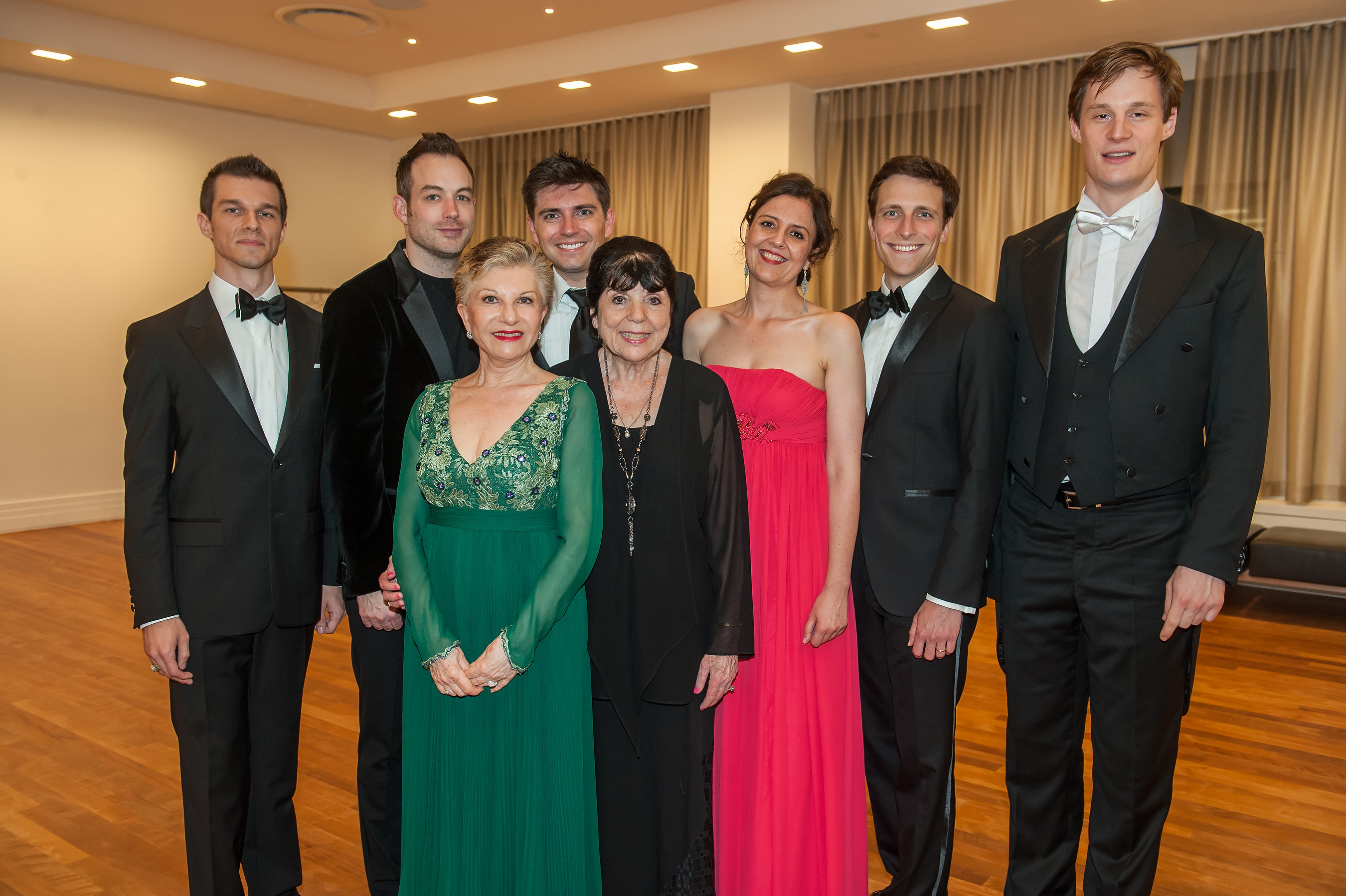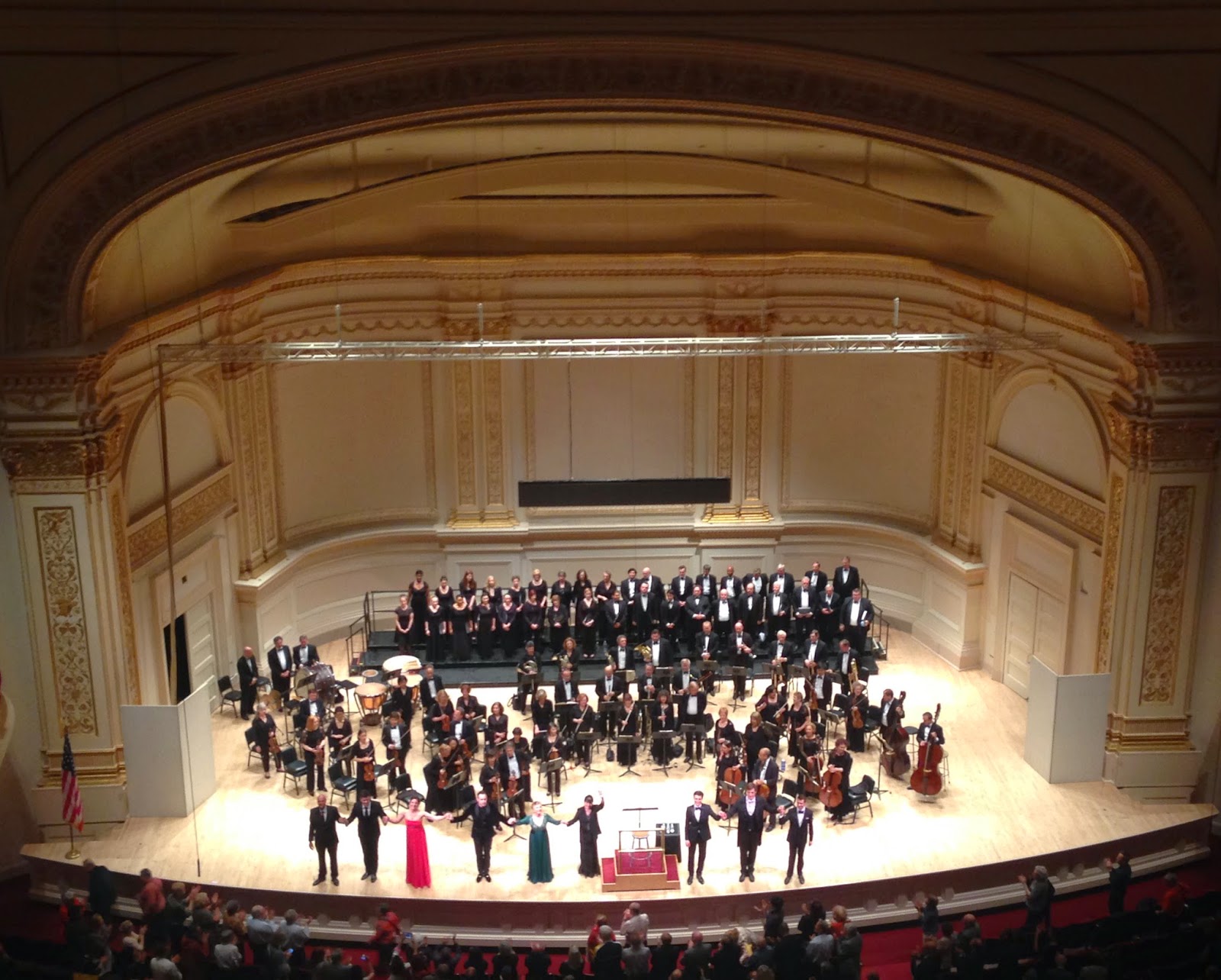
David Pershall with Mariella Devia, Stepehen Costello, Eve Queler, Géraldine Chauvet, John Kapusta, Andre Courville, and Sava Vemic
Roberto Devereux at Carnegie Hall June 5, 2014
From a Wistful Queen, Longing and RegretMariella Devia Returns to New York in ‘Roberto Devereux’THE NEW YORK TIMESJUNE 6, 2014Divadom, like the price of gold, thrives on scarcity. The most elaborate mystiques and fervent cults build up around singers one rarely hears live. Any artist sounds better in a mixture of memories and hopes than in life.In New York, the aura of absence has had ample time to condense around the Italian soprano Mariella Devia, 66, who on Thursday returned to the city as Elizabeth I in the Opera Orchestra of New York’s concert performance of Donizetti’s “Roberto Devereux” at Carnegie Hall.A regular at the Metropolitan Opera in the 1980s, Ms. Devia last sang with that company in 1994. Since then she has had a few appearances with the Opera Orchestra of New York and its founding conductor, Eve Queler, but nothing in years.Her fans have caught her on YouTube and bided their time as she underwent a reputational transformation from respected to revered. She was greeted as a conquering heroine on Thursday, with an ovation before she had sung a note, a louder one after her first aria and a tumultuous reception at the end, spurred by her final note, a clear high D.It is remarkable that Ms. Devia is still in possession of a high D at all, let alone one so penetrating. She has carefully husbanded her resources over the decades, and she can still deliver a classy, effective performance. Sure of pitch and elegant in its phrasing, her modest-size voice has taken on a melancholy wistfulness.This made her small, tender moments even more moving than her restrained rages and powerful climaxes. She captured Elizabeth’s dignity, longing and regret in artful details, like a pristinely painful diminuendo on the words “Oh, rimembranza!” (“Oh, memories!”) in a duet with the queen’s wayward beloved, Robert of Essex, the opera’s title character.As Robert, the tenor Stephen Costello sang with a healthy, bronzed tone, but his voice strained toward its higher reaches. While individual notes were impressive, he didn’t sustain long phrases, so intensity never accumulated, and he carried himself onstage with the hangdog impatience of a man in line at the post office.The baritone David Pershall, passionate and resonant, was better as the jealous Duke of Nottingham, whose wife is also in love with Robert. The chocolaty tone of the mezzo-soprano Géraldine Chauvet (the Duchess, Sara) was pushed to its limits in fast coloratura. Smaller roles were taken by three impressive young singers: the bass Sava Vemic, the tenor John Kapusta and the bass-baritone André Courville.Ms. Queler, making a guest appearance after ceding her music directorship to Alberto Veronesi in 2011, has always been better at selecting intriguing repertory and casting singers than at leading performances. But while her conducting on Thursday could have been more flexible, she outdid in spirit and polish anything the city had so far heard from Mr. Veronesi.With a veteran on the podium and a venerable star, this was opera as old-time religion, and the congregation ate it up.” by Zachary Woolfe
Shared via AddThis on 11/23/2014 from www.nytimes.com

Curtain Call
Opera Review: All Hail the QueenThe Opera Orchestra of New York presents Roberto Devereux.SUPER CONDUCTORJune 2014“There was a definite feeling of nostalgia surrounding Thursday night’s concert performance of Roberto Devereux at Carnegie Hall, the lone season offering this year from the Opera Orchestra of New York. Not only did this concert mark the return of Eve Queler to the podium, but it was also the long-awaited New York return of semi-legendary 66-year-old soprano Mariella Devia in the key role of Elizabeth I, Queen of England. This was the singer’s first New York appearance in 15 years.Roberto Devereux is a bel canto lover’s dream, the third of three Donizetti operas (with Anna Bolena and Maria Stuarda) referred to as the “Three Queens” trilogy. (Long lost in obscurity, these operas enjoyed a revival of interest a half-century ago, when Beverly Sills sang all three royal roles in repertory at the New York City Opera.) Here the Queen is Elizabeth I, and the opera is a fast-and-loose version of her rumored affair with Robert Devereaux, the Earl of Essex whose 1601 rebellion against the Crown provides the background for this tale of adultery, infidelity and its roal consequences.In the demanding role of the Queen, Ms. Devia proved a magisterial presence, radiating energy from her side of the stage. She combined genuine vocal power with a lifetime’s worth of stage experience, pacing herself through the grueling evening but still engaging fully in arias and ensembles. In the Queen’s rage at being betrayed by her lover Devereux (the Earl of Essex, played by Stephen Costello) she fearlessly rose up into Donizetti’s difficult ornamentation and fioratura singing, decorating each phrase with carefully placed notes.Ms. Devia proved to be at her best in tender, intimate scenes, moments before flying off the handle as the depths of Essex’ infidelity (with her favored handmaiden, no less!) revealed itself. The best part of her interpretation was the long final scene, which began with a blood-curdling vision of the headless Essex haunting her dreams–with a hollow sound in her voice that was simply blood-curdling. In her final expression of remorse, she floored the packed house with one last ringing high D.Stephen Costello was Essex, delivering a performance that featured moments of brilliance with occasional lapses into the ordinary. From his first entrance Mr. Costello’ had about him the hangdog look of defeat, making his eventual execution a foregone conclusion. He was fine in the propulsive second act, in which Essex’ fate is sealed However, his final aria in the Tower of London (an idea that librettist Salvatore Cammarano recycled for Il Trovatore) ended with the singer’s voice evaporating to a rasp at exactly the wrong moment.Ms. Chauvet started the evening with a flinty, metallic tone that didn’t always rest easy in the vocal line. However, she improved as the opera progressed, singing with greater warmth and flexibility in the latter part of the evening. She capped her performance with a blistering Act III duet with Nottingham (David Pershall.) As the jealous Nottingham, Mr. Pershall was the surprise star of the opera, combining vulnerability and rage in an intense and appealing way. Another standout was bass Sava Vemic, towering and black-toned in the tiny role of Sir Walter Raleigh.Aside from the return of Ms. Devia, the other welcome figure on this stage was Ms. Queler, the longtime leader of the Opera Orchestra of New York and currently its Conductor Emeritus. All in all this was a remarkable comeback for both orchestra and conductor, who had been silent since a disastrous Andrea Chénier (under Alberto Veronesi) last season. As Ms. Queler led her reconstituted orchestra in the overture, the trumpets and horns sounded out the familiar melody of “God Save the Queen.” They might have meant it for their conductor.by Paul J. Pelkonen
Shared via AddThis on 11/23/2014 from super-conductor.blogspot.com/